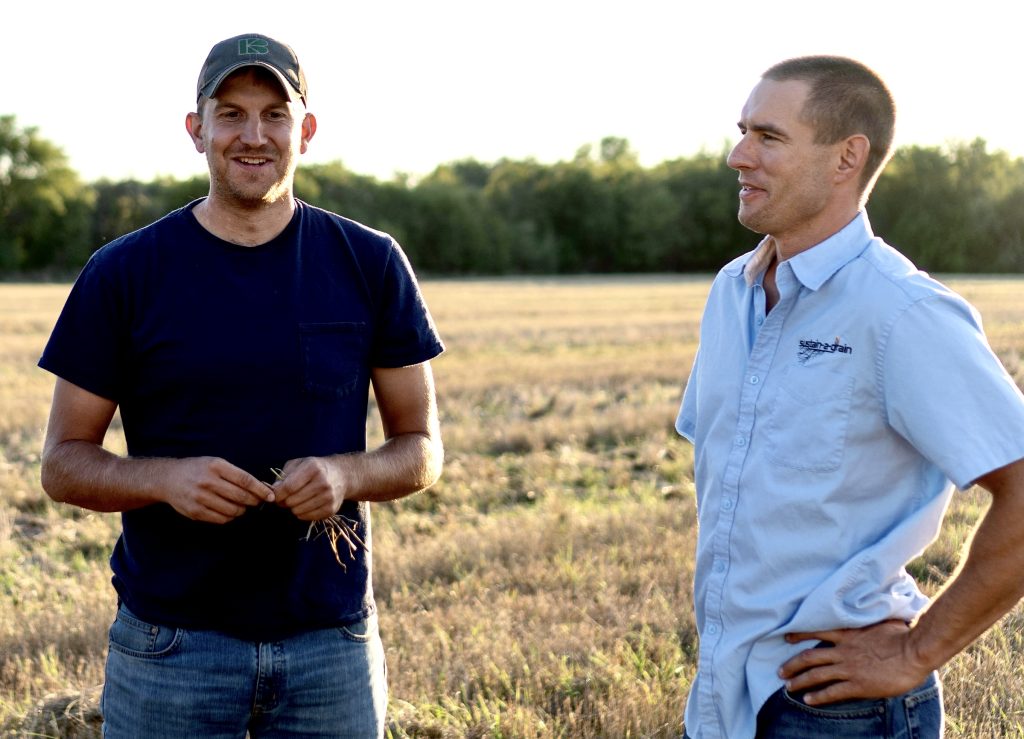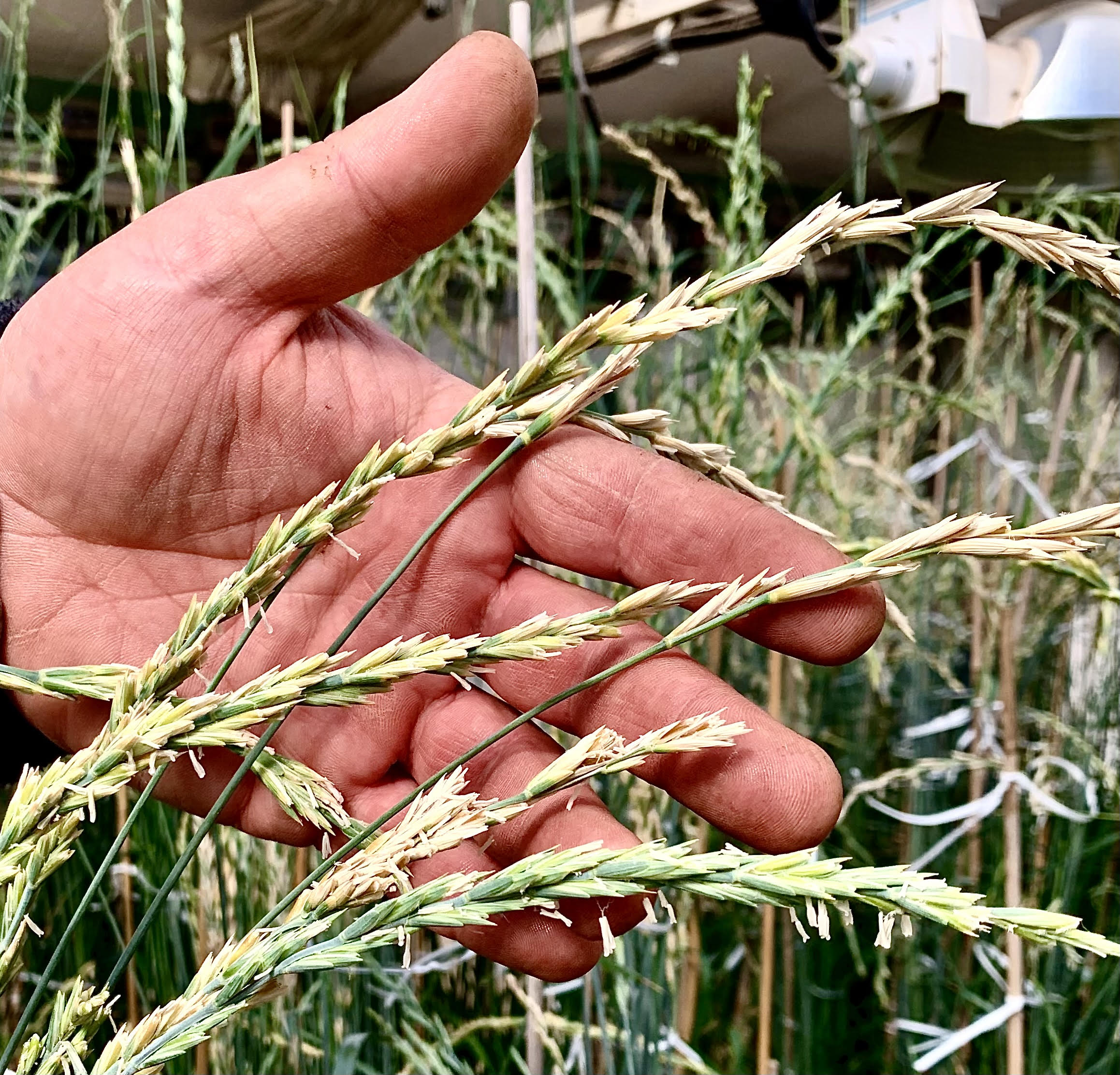A simple plant that began to take root as a grain crop several decades ago has been refined in Kansas to reach revolutionary potential.
With the help of researchers and proponents, Kernza is rising in popularity and has some thinking it could change the way the world is fed, while simultaneously providing fixes for an ailing environment.
The crop with seeds suitable for inclusion in human foods is set for a grand opening in Kansas during Earth Day weekend April 19 through 22. Pictured above is a sample of Kernza raised in a greenhouse at The Land Institute near Salina, Kansas, sports a different look than annual winter wheat. (Photo by Tim Unruh.)
“It’s the Wild West of food exploration for Kernza,” said James Bowden, a Saline County farmer-rancher and former researcher at The Land Institute near Salina, where the perennial wheatgrass was domesticated as a grain crop.
Packed with protein and fiber, and containing fewer carbohydrates than annual wheat, the crop doesn’t have to be replanted every year and holds a wealth of possibilities.
“There’s a lot of opportunities that we have yet to realize in Kernza because it is a very versatile grain,” Bowden said.
“People have used it in beers and pasta, in desserts, as a part of breakfast, and in flat breads like naan,” he said. “My personal favorite things made with Kernza are pancakes.”
Earth Day weekend
The Earth Day weekend event, dubbed Kernza4Kansas, will feature the grain in food and beverages at restaurants, breweries and other sites from Wichita north to Courtland, west to Wilson and Sylvan Grove and east/southeast to Council Grove and Emporia.
Salina will serve as the epicenter, and Bowden, Brandon Schlautman, Kathryn Turner and others will be on hand to answer questions about Kernza and sing its praises.

“Kernza was developed in Kansas,” said Schlautman of Moundridge-based Sustain-A-Grain, a business he co-founded with Brandon Kaufman. “It’s being grown by farmers in Kansas. It’s better for the environment and better for the people.” They have been growing, processing and marketing Kernza since 2018. Schlautman doubles as lead scientist at The Land Institute, working on perennial legumes.
“The Land Institute domesticated this awesome crop,” he said. “(Scientists and technicians) did all the research, breeding and early education. We at Sustain-A-Grain are co-hosting Kernza4Kansas with The Land Institute to let Kansas people know about the crop, taste it and get better access to it.”
Pushing Kernza into the mainstream of agriculture involves improving the crop, influencing more farmers to produce it and gaining the interest of consumers with tasty and healthy options both in home kitchens and on restaurant menus.
Proponents aim for all of the above to improve after Earth Day as the new grain gains notoriety.
Kernza is now being grown and studied around the globe.
“It has been a long time in the making, built on the foundation and principles of the prairie,” said Turner, lead scientist in crop protection and genetics at The Land Institute.
For the potential to be realized, she said, Kernza must be put to use.
“I would like 50% of farmers to know about it in Kansas and at least 10% to have tried it in their fields within the next 10 years,” Turner said.
Adding to the plate
From there, proponents aim for Kernza to find its way to more tables.
Sign up for HPJ Insights
Our weekly newsletter delivers the latest news straight to your inbox including breaking news, our exclusive columns and much more.
“If we had 10% of Kansas businesses selling and making items with Kernza in a year, and then we increase by 5% every year, that’s what I want to see,” she said. “I want every person in Kansas to have tried Kernza within the next 10 years.”
While hopes are high for the grain crop, Lee DeHaan PhD, lead scientist for the domestication of Kernza at The Land Institute, cautions that the crop “is a work in progress,” with a number of improvements pending.
“The important thing to know is there is lots of work still to be done, to increase the yield and other properties of the crop,” he said. “Using modern breeding techniques, we may achieve yield similar to wheat in about 15 years.”
Marketplace still developing
While Kernza improves over time, central Kansas has the infrastructure in place right now to further develop and grow the market, Schlautman said.
“There are barely 1,000 acres in Kansas right now, and Sustain-A-Grain has been working with nearly every one of those producers,” he said. “We need 100,000 or more acres. We want to be able to help more Kansas farmers grow Kernza, but to do that, we need to build demand and markets locally and nationally. Doing that will require more time, more capital, more collaboration with The Land Institute and organizations like the Kansas Department of Agriculture, while adding to our team at Sustain-A-Grain, including full-time people like James (Bowden) and a marketer for national food brands.”
Earth Day could add momentum to build demand for the crop, for the sake of both the farm economy and Earth.
“If everything were to fall into place with this event, the sky is the limit,” Bowden said. “Kernza would be incorporated into every kitchen, restaurant, food retailer and grocery store across the country. So much demand for this product would be created that we would have to double or even triple the number of farmers and acreage to grow the supply needed to fulfill the orders coming in.”
Producers would be fairly compensated, and Kernza would be part of all farms, regardless of age, race, gender or any of the other silos of diversity,” he said. “Everyone from farmer to factory worker would be well aware of the benefits this crop provides to their environment, whether through soil conservation, carbon sequestration or its ability to maintain clean, quality water.”
He added, “This is the dream, but the market has to be there to make the dream come true.”
Tim Unruh can be reached at [email protected].




